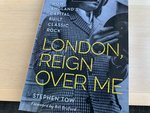Stephen Tow is a brilliant writer and researcher, but his timing is world-class unlucky. Tow is the author of “London, Reign Over Me: How England's Capital Built Classic Rock” (Rowman & Littlefield), which chronicles the rock music from the British Isles in the 1960s and early '70s.
This item is available in full to subscribers.
We have recently launched a new and improved website. To continue reading, you will need to either log into your subscriber account, or purchase a new subscription.
If you are a digital subscriber with an active subscription, then you already have an account here. Just reset your password if you've not yet logged in to your account on this new site.
If you are a current print subscriber, you can set up a free website account by clicking here.
Otherwise, click here to view your options for subscribing.
Please log in to continue |


Stephen Tow is a brilliant writer and researcher, but his timing is world-class unlucky. Tow is the author of “London, Reign Over Me: How England's Capital Built Classic Rock” (Rowman & Littlefield), which chronicles the rock music from the British Isles in the 1960s and early '70s. Anyone who has enjoyed the music of the British Invasion of the 1960s (the Beatles, the Rolling Stones, the Hollies, the Kinks, the Animals, Gerry and the Pacemakers (lead singer Gerry Marsden just died Jan. 3 at age 78), et al, cannot help but be hooked by Tow's stories about these trend-setters, 90 of whom he interviewed. I read the entire book in one weekend when my reading was interrupted only by meals.
On the downside, the book was published on Feb. 15 last year, just a few weeks before the coronavirus pandemic wiped out all personal authors' appearances and book tours, not to mention live theater, concerts, dance recitals, movie theaters, restaurants and so much more.
“So a number of book signings and readings were canceled,” said Tow, 58, a history professor at Delaware Valley University in Doylestown. “I'm hoping to take another run at it after the vaccine makes its rounds. There were some record stores, local libraries and college events I hope to reschedule for the fall. I'll put all of it up on my website (stephentow.com) once that happens.”
Tow, who also authored “The Strangest Tribe: How a Group of Seattle Rock Bands Invented Grunge” (Sasquatch Books, 2011), grew up in Levittown and now lives in Abington. Why would a professor with an accounting degree from Penn State (1985) and a master’s degree in history from West Chester U. (2006) spend years researching and chasing down more than 90 old British rock stars to write this book?
“I wrote it because I’m an enormous fan of music,” Tow told us. “The Beatles broke up when I was 7, so I always felt I missed out on that great era of music. By the time I came of age in high school in the late ’70s, mainstream music had gotten pretty stale. I could name 20 artists who had vital records in the late ’60s or early ’70s and released ‘meh’ albums in the late ’70s. I mean, compare ‘Who Are You?’ to ‘Who’s Next?’ or ‘In Through the Outdoor’ to ‘Led Zeppelin II’…
“I found the music boring, so that’s when I discovered the earlier era. One of my roommates’ girlfriends gave me a copy of ‘Quadrophenia,’ and I was like, ‘Wowwww! This is so much better than what’s popular today.’ So I spent the ’80s discovering music popular two decades prior — the Stones, Who, Hendrix, Zeppelin, Jethro Tull, Yes … It all sounded much better to my ears than contemporary mainstream music.
“Later on, when Nirvana and Seattle toppled the 1980s, that became my ’60s. I loved it. Finally, bands were back. The music was back. So that became the subject of my first book, ‘The Strangest Tribe,’ where I explored how and why grunge came to Seattle.”
For “London, Reign Over Me,” how difficult was it to get interviews with 90 British rock stars from the ‘60s? “It wasn’t easy. I don’t come from the typical music writer pipeline. I didn’t write for Rolling Stone magazine. I didn’t have lunch with Elton John the other day. It was sheer persistence, literally years of waiting it out. Eventually I was able to score some high-profile interviews with people like Ian Anderson and Martin Barre of Jethro Tull; Steve Howe, Rick Wakeman and Jon Anderson of Yes, Dave Davies of the Kinks, Peter Frampton, John Mayall, Peter Noone, Paul Rodgers and many others.”
Because most of Tow’s interviewees live in the UK and the author lives here, most of the interviews were conducted over the phone. Tow did do some in-person in England when he was over there for research. A few preferred written interviews by email.
Who were Tow’s favorite interview subjects and why? “Greg Lake of King Crimson, and Emerson, Lake & Palmer was such a warm interview. His passion and love for the music went beyond the standard ‘professional’ interview. Also Peter Noone of Herman’s Hermits and Stan Webb of Chicken Shack (a late ’60s blues band that featured Christine Perfect, later Christine McVie) went way off-script. I didn't even have to ask them any questions. What resulted was some great stories about just living and experiencing the craziness of that era.”
For more information, visit stephentow.com. Len Lear can be reached at lenlear@chestnuthilllocal.com